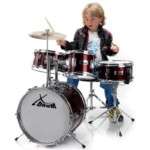Rhythmic music for sports
It is no secret that playing sports requires a certain amount of physical effort, and sometimes to the limit of what is possible for professional athletes.
Many experts unanimously claim that melodic, rhythmic music helps maintain the required tempo in exercises. But, as you know, music is very diverse; some can have a positive effect on performing certain exercises, while others, on the contrary, can disrupt your breathing or rhythm.
Experts have proven that rhythmic music for sports increases the amount of calories consumed due to the fact that the clarity and strength of the exercises performed increases. Rhythmic music for sports stimulates the human body, forcing it to work at full capacity, applying maximum effort to each exercise.
Choosing music for a sport
The music must be rhythmic, as this affects the speed of the exercises. And one more important fact: music must necessarily correspond to the taste of the athlete, otherwise its perception and impact will be zero.
Run. For a light evening jog, music with a leisurely rhythm but tangible beats is best suited. Step speed and breathing rate depend on them. For fast running, you should choose music that can cause an explosion and a surge of adrenaline, which will allow you to cover the sprint distance at maximum speed.
Outdoor training. To perform exercises on a sports ground in the fresh air, using parallel bars and horizontal bars, in principle, any rhythmic music for sports is suitable. The main thing is that the athlete likes it, lifts his spirits and gives him vigor.
Fitness. Music for fitness classes should provide convenience for counting the number of repetitions. It is recommended to select melodies without pauses so as not to disrupt the overall rhythm of the workout. In exercises where strength and cardio loads alternate, you can choose compositions with a jagged rhythm.
Power loads. For this type of training, heavier music with a pronounced rhythm and not too fast tempo is suitable. This allows you to clearly focus on the exercise and perform it more effectively, with greater impact and final results.
Not every kind, not every music
But for team sports, rhythmic music is not at all acceptable. It will have the exact opposite effect: distract athletes, interfere with concentration and, ultimately, bring discord into the actions of the players.
American scientists conducted a study that confirms that rhythmic music for sports can increase the effectiveness of exercise by 23 percent, compared to training without music. But such results can only be achieved if the music is chosen correctly in all respects. Also, do not forget that when choosing music for sports, you should first of all be guided by personal preferences, and only then focus on the type of sport.
Finally, watch a video clip of extreme sports accompanied by beautiful music:





